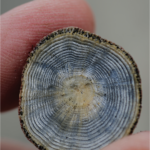[For the second day of Just Science, I asked Henry Ruhl, fellow MBARI’ian and deep-sea ecologist to discuss a new project he is involved with]
Much of what we know about temporal variability in deep-sea ecology comes from only a few locations and most timeseries studies extend back less than two decades. Comprehensive understanding of both natural variability and anthropogenic impacts will require longer datasets. Providing some certainty about the spatial extent of any observed trends will require the inclusion of currently under-sampled locations such as the southern Atlantic. Collaborations between those conducting industrial activities and research in deep-water have great potential to help collect these much needed data and expand scientific understanding and public education of marine science.
The DELOS program (Deep-ocean Environmental Long-term Observatory System) is one such collaboration between the University of Aberdeen Oceanlab, the National Oceanography Centre in Southampton, UK, University of Glasgow, Texas A&M, the Monterey Bay Aquarium Research Institute, and BP. During the initial phase of DELOS a pair of deep-sea observatories will be deployed at a BP deep-water facility location off the coast of Angola. One observatory will be placed within an operating facility field and one will be positioned afar for comparison with background conditions. Assembly of observatory components is underway and deployment of the first system is expected later this year. The program aims to provide insights into on-site industry impacts and provide additional understanding of how climatic processes can link to life in the deep sea. Future DELOS activities aim to synergize the technological advancements of both science and industry by including real-time data acquisition and the possibility of experiment manipulation.
The SERPENT project (Scientific and Environmental ROV Partnership using Existing iNdustrial Technology) is another fruitful collaboration between marine researchers and the oil and gas industry. It provides scientific researchers access to industrial data and ROV resources at many locations. Both DELOS and SERPENT are resulting in advancements that would not otherwise be possible. With this new access to resources, deep-sea researchers and industry now have an extraordinary opportunity to lead the way towards the informed use of deep-ocean resources.
http://www.abdn.ac.uk/mediareleases/release.php?id=403
http://www.serpentproject.com/
Share the post "Just Science #2: Science and Industry Collaboration in Deep-Sea Research"





